Clifford Garstang's Blog, page 117
November 16, 2011
National Book Awards 2011 (LIVEBLOG)
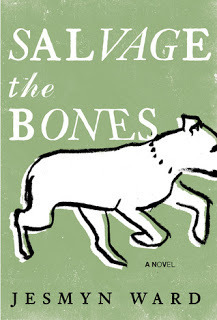 Jesmyn Ward wins the National Book Award for Fiction. I've heard such great things about Salvage the Bones.
Jesmyn Ward wins the National Book Award for Fiction. I've heard such great things about Salvage the Bones.National Book Awards 2011 (LIVEBLOG):
'via Blog this'
Published on November 16, 2011 19:48
November 15, 2011
The New Yorker: "The Climber Room" by Sam Lipsyte
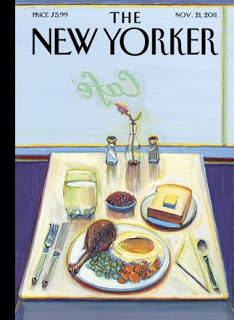
November 21, 2011: "The Climber Room" by Sam Lipsyte
This is the third Lipsyte story in The New Yorker in thelast 13 months. The first of the three I didn't like much. The second one, "Deniers,"I thought was much better. And I liked this one a lot, at least until theending, and that I'm not so sure about.
The story is about Tovah Gold, who, interestingly, is aminor character in "Deniers." (Check out the Q&A with Sam Lipsyte in whichhe's asked if that suggests he's working on a bigger project, to which hereplies that he's working on a collection of stories linked by the fact that hewrote them. Heh.) In "Deniers" I liked Tovah because she was a send-up of thepretentious poet. In this story, she's grown up a little, and is lesspretentious, but is attempting recover her fondness for poetry. She is employedin a private pre-Kindergarten, which exhausts her (although it's a part-timejob), and in that capacity comes to know little Dezzy (short for Desdemona),the daughter of Randall Gautier. (When he introduces himself, she thinks he hassaid "Randy Goat," which turns out to be close enough.)
Because life isn't going anywhere for Tovah—not that she'sunhappy, but she's sort of treading water—she fantasizes about becoming Mrs.Randy Goat. And, more to the point, about having Randy Goat's baby. She issuddenly, at age 36, anxious to have a baby: "It didn't matter if the baby washers except it absolutely did. She wanted to carry it and give birth to it andbreast-feed it and live in a natural cocoon with it for as long as possible,with somebody on the outside slipping everything she needed through a slimvent." (Which makes it seem a bit like prison, doesn't it?)
And then the story, or its climax, is what actually happensbetween Tovah and Randy. It allows Lipsyte to give Tovah a nice monologue,which begins, "You know, it's very hard. Here. In America. In the world. Forwomen." Which, if this story has a point, is pretty much it. And then . . .
I'm sorry the story is behind the paywall, but I don't wantto give away the ending.
Published on November 15, 2011 11:23
November 11, 2011
Tips for Writers: Write What You DON'T Know (about what you know)
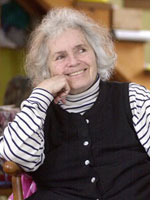 An oft-repeated rule for writers is "write what you know."Most of us accept this on faith because it seems to make sense. Among otherthings, the better you know a subject, the more details will be at your commandand the more likely it will be that you will establish authority on the pagethat will inspire the reader's confidence. Our most credible writers of warstories—Tim O'Brien comes to mind—are veterans themselves. (Happy Veterans' Day!)They know what they're talking about, and it shows up in their work.
An oft-repeated rule for writers is "write what you know."Most of us accept this on faith because it seems to make sense. Among otherthings, the better you know a subject, the more details will be at your commandand the more likely it will be that you will establish authority on the pagethat will inspire the reader's confidence. Our most credible writers of warstories—Tim O'Brien comes to mind—are veterans themselves. (Happy Veterans' Day!)They know what they're talking about, and it shows up in their work.However, one of America's great writers of the TwentiethCentury took a different angle on this rule. I had the privilege of studyingwith Grace Paley at a little-known writers' conference in Mexico called Underthe Volcano. I was in awe of Paley, despite the fact that she was this tiny,somewhat frail, extremely generous and kind, grandmotherly woman. And she wasalso full of good advice, including the debunking of some "rules" of writing.
It's not, "write what you know," she insisted, it's "writewhat you don't know about what you know." Otherwise, it's boring. For you andthe reader. What's the point of writing, I think she meant, if you're justgoing to explore known territory. Stretch. Reach. Push beyond and take somerisks.
And sometimes, knowing a subject too well prevents thewriter from really seeing it.
For example, I once wrote a short story set in a coffeeshop. In a workshop, I was told by the leader—a famous novelist—that thesetting was too vague, and that the problem was that I hadn't fully imaginedthe place myself, so of course I couldn't render it on the page so that readerscould see it. In fact, though, the opposite was true, and the famous novelistrealized this as soon as he'd made his original pronouncement. The coffee shopof the story was based on a coffee shop I knew well and frequented. The reasonthat it didn't appear clearly on the page was that I knew it too well, and was no longer reallyseeing it. I had an image of it in my head that subconsciously I believedeveryone else could see, too. What I needed to do was to really see the coffee shop—the real one or an imagined one—in orderto describe it effectively. I needed to discover things about this coffee shopthat I didn't know, or had overlooked, and that'swhat I needed to write.
I'm currently writing a novel set in Singapore. I knowSingapore. I lived there for ten years. So I'm able to get a lot of what I needfor this story just from my own experience. But then I'll push beyond what Ialready know to discover some of the history of the country—which is moreinteresting than modern readers might imagine—and to "drill down," so to speak,to discover things beneath the surface that I hadn't seen before. But there'smore to this exploration, because of the character traits I'm writing about—butI'll save that topic for another day.
For another take on this issue, see Bret Anthony Johnston's essay from The Atlantic: Don't Write What You Know.
Published on November 11, 2011 11:04
November 10, 2011
The New Yorker: "Miracle Polish" by Steven Millhauser
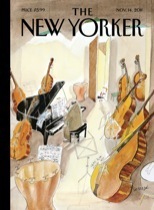
November 14, 2011: "Miracle Polish" by Steven Millhauser
The good news is that this week's story is available forfree online. And it's worth reading. I certainly found myself completelyengaged to the end, as I almost always am with Millhauser's work.
The first person story is about a middle-aged guy who buyssome "Miracle Polish" from a door-to-door salesman because he feels sorry forhim. The narrator puts the stuff in a drawer and forgets about it until one dayhe sees a smudge on a mirror. He ends up polishing the whole mirror and what hesees amazes him: "There was a freshness to my image, a kind of mild glow that Ihad never seen before." He polishes the other mirrors in his house, and feelssilly for being tricked by the polish. His girlfriend comes over and sees ittoo. The guy gets more mirrors and polishes them all. He's not only a littlecompulsive about it, but he thinks of the reflection as somehow separate fromhimself, and Monica's from hers. Monica is a bit jealous of her own reflection.
They go on a picnic, which seems to be glorious. Millhauseremphasizes the sunlight—Monica's blouse has a shimmer to it, she takes her hatoff and lets "the sunlight ripple over her face"; a jewel sparkles in herearlobe; she "takes in the sun with closed eyes". Thanks to the bright sun,then, she seems to have become the woman in the mirror, instead of the dark,tightly wound woman she usually is. But the sun has a different effect on thenarrator—the glare of the sun on the water hurts his eyes; the heat isoppressive; he feels despair. But he feels better, oddly, when he sees theirreflection in his mirror back home.
Then comes the ultimatum. He must choose between Monica andher reflection. He worries about it and then makes his decision, even though hebelieves that the reflection is the true Monica, the "hidden Monica." Hethinks, "I was able to see in the depths of those mirrors, the world no longerdarkened by diminishing hopes and fading dreams."
And the story rolls along to its climax.
But what does it all mean? It's a bit of a fairy tale, itseems to me, in which the narrator learns a lesson about letting the light intohis life. But the lesson gets muddled by Monica's reaction, and the fact thatwhen real life gives her light—on the picnic—she seems to come alive. The lightthat the narrator sees, though, is artificial. He learns a lesson, but it seemsto be the wrong one. And he pays a price.
Another interesting story from Millhauser.
Published on November 10, 2011 10:57
2012 Pushcart Prize Rankings (Nonfiction)
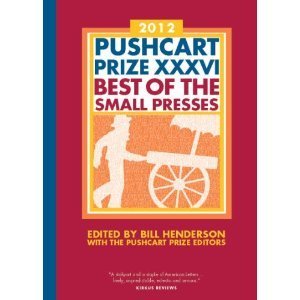 [Note: If you find this Pushcart Prize Ranking useful, please consider making a donation to support this blog. Alternatively, you could buy my book. See the buttons at right. Thank you.]
[Note: If you find this Pushcart Prize Ranking useful, please consider making a donation to support this blog. Alternatively, you could buy my book. See the buttons at right. Thank you.]
As you may know, I recently supplemented my annual Pushcart Prize Ranking for Fiction with a new list--the Pushcart Prize Ranking for Nonfiction. Like the fiction list, each magazine recognized over the past ten years (2003-2012) is awarded points for the number of prizes it has won and fewer points for the number of special mentions. The numbers are totaled and the ranking is generated.
While the Pushcart Prize is subjective, my ranking is entirely objective. I find it a useful resource for comparing magazines. Others have told me that they do also. Use it as you see fit.
As with the fiction list (this year's list can be found here), magazines that have ceased publication are marked with © and magazines for which I have no information or cannot find a website are marked with (?). If you have additional information for me, I'd appreciate it if you could leave a comment below.
What have we learned in this update? Not much. The top ten shuffled a little, but remained the same.
Orion kept pace with Georgia Review because they each earned one prize and two special mentions, but Georgia Review actually lost a little ground when the data for 2002 was removed. Hudson Review dropped in the rankings; Harvard Review and n+1 both jumped. Otherwise, there weren't a lot of big movers.
Nonfiction Pushcart Prize Ranking for 2012
2012 Magazine 2012 Score 1 Georgia Review 72 2 Orion 58 3 Agni 42 4 Fourth Genre 38 5 Conjunctions 37 5 Threepenny Review 37 7 American Scholar 36 8 Gettysburg Review 35 8 Iowa Review 35 8 Sun 35 11 New Letters 29 11 Southern Review 29 12 Missouri Review 28 14 Tin House 26 15 Creative Nonfiction 24 16 Raritan 19 16 Shenandoah 19 18 River Teeth 18 19 Ploughshares 16 19 Virginia Quarterly Review 16 20 Antioch Review 15 20 Boulevard 15 20 Brain, Child 15 20 Colorado Review 15 20 Kenyon Review 15 20 Michigan Quarterly Review 15 20 Salmagundi 15 27 Hudson Review 14 27 Image 14 30 Ecotone 13 30 Paris Review 13 32 Bellevue Literary Review 12 32 Harvard Review 12 32 n+1 12 34 Poetry 11 34 Speakeasy © 11 34 Third Coast 11 34 Witness 11 39 Five Points 10 39 Great River Review 10 39 ZYZZYVA 10 42 TriQuarterly 9 43 Ninth Letter 8 43 Northwest Review 8 43 Southwest Review 8 45 American Poetry Review 7 45 New England Review 7 45 The Journal 7 45 Water-Stone Review 7 50 Passages North 6 50 Pleiades 6 52 Arts & Letters 5 52 Fugue 5 52 In Character © 5 52 Massachusetts Review 5 52 North Dakota Quarterly 5 52 Oregon Humanities 5 52 Republic of Letters 5 52 Shearsman 5 52 The Point 5 52 Yale Italian Poetry 5 52 Zoetrope: All Story 5 52 Sweet 5 52 Tusculum 5 52 Seattle Review 5 66 Parnassus 4 66 Sewanee Review 4 68 Alimentum 3 68 Fiction International 3 68 Gulf Coast 3 68 Hunger Mountain 3 68 Kyoto Journal 3 68 Manoa 3 68 North American Review 3 68 World Literature Today 3 76 A Public Space 2 76 Alaska Quarterly Review 2 76 Ascent 2 76 Asian American Writers Workshop 2 76 Believer 2 76 Bellevue Literary Press 2 76 Bellingham Review 2 76 Blackbird 2 76 Boston Review 2 76 Columbia Review 2 76 Connecticut Review 2 76 Doubletake © 2 76 Florida Review 2 76 Hollins Critic 2 76 Hotel Amerika 2 76 Lapham's Quarterly 2 76 Narrative 2 76 Oxford American 2 76 PMS 2 76 Post Road 2 76 Provincetown Arts 2 76 Santa Monica Review 2 76 Writers Chronicle 2 76 Yale Review 2 100 42 Opus 1 100 American Interest 1 100 American Letters & Commentary 1 100 American Short Fiction 1 100 Another Chicago Magazine 1 100 Arkansas Review 1 100 Asia Literary Review 1 100 Baffler 1 100 Bat City 1 100 Black Pearls 1 100 Blood Orange Review 1 100 Bomb 1 100 Brick 1 100 Callaloo 1 100 Canteen 1 100 Chautauqua 1 100 Cimarron Review 1 100 Confrontation 1 100 Crazyhorse 1 100 Denver Quarterly 1 100 Divide ? 1 100 Epoch 1 100 Europa Editions 1 100 Event 1 100 Fiction 1 100 FreshYarn.com 1 100 Graywolf Press 1 100 Haystack Mountain 1 100 Healing Muse 1 100 High Country News 1 100 Idaho Review 1 100 Indiana University Press 1 100 Iron Horse Literary Review 1 100 James White Review ? 1 100 Lit 1 100 Literary Imagination 1 100 Literary Review 1 100 Make ? 1 100 Marginalia © 1 100 Memoir 1 100 Meridian 1 100 Milkweed Editions - Press 1 100 Minnesota Review 1 100 New Haven Review 1 100 New Ohio Review 1 100 Noon 1 100 Northern Lights (?) 1 100 On the Page 1 100 Ontario Review © 1 100 Open City 1 100 Open Spaces 1 100 Other Voices © 1 100 Palo Alto Review ? 1 100 Partisan Review © 1 100 Pen America 1 100 Portland Magazine 1 100 Portland Review 1 100 Prairie Schooner 1 100 Prism 1 100 Rain Taxi 1 100 Relief 1 100 River City Publishing 1 100 River Styx 1 100 Rosebud 1 100 Rumpus 1 100 Seneca Review 1 100 SN Review 1 100 Southampton Review 1 100 Stone Canoe 1 100 Stranger 1 100 Subtropics 1 100 Tiferet 1 100 Under the Sun 1 100 University of Notre Dame Press 1 100 Vocabula Bound 1 100 Wag's Revue 1 100 War, Literature and The Arts 1 100 Weber Studies 1 100 Western Humanities Review 1 100 Willow Springs 1 100 Malahat Review 1 100 University of Michigan Press 1 100 Point, The 1
Published on November 10, 2011 10:23
2012 Pushcart Prize Rankings (Fiction)
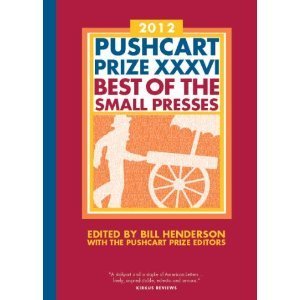 [Note: If you find this Pushcart Prize Ranking useful, please consider making a donation to support this blog. Alternatively, you could buy my book. See the buttons at right. Thank you.]
[Note: If you find this Pushcart Prize Ranking useful, please consider making a donation to support this blog. Alternatively, you could buy my book. See the buttons at right. Thank you.]
It is that time of year again. My copy of the 2012 Pushcart Prize Anthology arrived in the mail yesterday and I have been updating the rankings. I will start with the list for Fiction. The updated Non-fiction list is here.
I feel compelled every year to offer a disclaimer for the list. I originally created it in order to aid my own efforts at targeting my submissions of short stories to literary magazines. I used the Pushcart Prize because I felt that it represented the broadest range of magazines among the annual prizes (including Best American Short Stories and the O. Henry Awards).
My method is straightforward. I use a ten-year rolling database and award points to magazines for the prizes awarded and fewer points for each special mention. I don't go further back than ten years because it seems to me that what is relevant is the current success of the magazines, not their storied past. Also, the further back we go, the more defunct magazines we find, and that's not terribly helpful. Some have argued that a five-year period should be chosen instead. That seems too small a sample. When only 19 or 20 prizes are awarded in fiction each year, I think ten years provides a clearer picture of a magazine's success.
Some people don't like rankings at all, and I understand that. This ranking, however, is as objective as I can make it. The Pushcart Prize itself is subjective, of course, but that's an entirely different question.
A note on symbols. I have marked magazines that I believe to have ceased publication with ©. Several magazines have a (?) by their name which means I can't find a website for them. Please leave any corrections in the comments.
What is notable about this year's list? Here are some observations:
Ploughshares maintains a sizable leadTin House moves into 2nd place, jumping over Conjunctions and Zoetrope, which are tied for 3rdGeorgia Review, on top of the charts for non-fiction, climbs 5 spots to #6, and Paris Review falls into a tie for 9th with the defunct Ontario Review, while Epoch drops out of the top ten.Both One Story and A Public Space make big moves up on the back of a double win for each (matched by Georgia Review)
So, here is the list:
Pushcart Prize Ranking (Fiction) for 2012
2012 Magazine 2012 Score 1 Ploughshares 103 2 Tin House 74 3 Conjunctions 72 3 Zoetrope: All Story 72 5 Southern Review 63 6 Georgia Review 54 7 Threepenny Review 50 8 One Story 48 9 Ontario Review © 46 9 Paris Review 46 11 Epoch 45 12 McSweeney's 42 12 New England Review 42 14 A Public Space 41 15 Kenyon Review 40 16 Five Points 34 16 Missouri Review 34 18 TriQuarterly 33 19 Boulevard 30 19 New Letters 30 19 Noon 30 19 Shenandoah 30 23 Antioch Review 29 23 Witness 29 25 Agni 28 26 Virginia Quarterly Review 27 27 StoryQuarterly 23 28 Mississippi Review 22 28 Sun 22 30 Gettysburg Review 21 30 Prairie Schooner 21 32 Iowa Review 20 33 Ecotone 19 34 Glimmer Train 18 35 Bellevue Literary Review 17 36 Michigan Quarterly Review 16 37 Colorado Review 15 38 Crazyhorse 14 39 Idaho Review 13 39 Willow Springs 13 39 Yale Review 13 39 ZYZZYVA 13 43 Alaska Quarterly Review 11 43 American Scholar 11 43 American Short Fiction 11 43 Harvard Review 11 43 Hudson Review 11 48 Narrative 10 48 Salmagundi 10 50 Chelsea © 9 50 Image 9 50 Oxford American 9 50 Third Coast 9 54 Calyx 8 54 Cincinnati Review 8 54 Post Road 8 57 Manoa 7 57 Pen America 7 57 Speakeasy © 7 57 Water-Stone Review 7 61 Caribbean Writer 6 61 Fence 6 61 Massachusetts Review 6 61 Mid American Review 6 61 New Orleans Review 6 61 News from the Republic of Letters 6 61 North American Review 6 61 Sonora Review 6 69 Black Renaissance Noire 5 69 Bridge © 5 69 Coffee House Press 5 69 Grand Street © 5 69 Indiana Review 5 69 Parkett 5 69 Pleiades 5 69 Raritan 5 69 Southwest Review 5 69 Univ. of Georgia Press 5 69 Little Star 5 80 Beloit Fiction 4 80 Black Warrior Review 4 80 Daedalus 4 80 Fiction International 4 80 Hopkins Review 4 80 Northwest Review 4 80 Other Voices © 4 80 Sewanee Review 4 88 Another Chicago Magazine 3 88 Appalachian Heritage 3 88 Doubletake © 3 88 Event 3 88 failbetter.com 3 88 Fiction 3 88 Graywolf Press 3 88 New York Tyrant 3 88 Ninth Letter 3 88 Pinch 3 88 River Styx 3 88 West Branch 3 88 Western Humanities Review 3 101 [sic] 2 101 American Letters & Commentary 2 101 American Literary Review 2 101 Bamboo Ridge 2 101 Bellingham Review 2 101 BkMk Press 2 101 Blackbird 2 101 Boston Review 2 101 Briar Cliff Review 2 101 Brooklyn Rail 2 101 Brooklyn Review 2 101 Carve 2 101 Chautauqua 2 101 Columbia Review 2 101 Confrontation 2 101 Crab Orchard Review 2 101 Faultline 2 101 Fifth Wednesday 2 101 Fourteen Hills 2 101 Gulf Coast 2 101 Hotel Amerika 2 101 Inkwell 2 101 J Journal 2 101 Meridian 2 101 Notre Dame Review 2 101 Paper Street © (?) 2 101 Passages North 2 101 Redivider 2 101 Sarabande Books 2 101 Sou'wester 2 101 The Journal 2 101 Timber Creek Review (?) 2 101 Turnrow 2 134 Amazon Shorts © 1 134 Antietam Review © 1 134 Art and Understanding 1 134 Artful Dodge 1 134 Arts & Letters 1 134 Ascent 1 134 At Length 1 134 Ballyhoo Stories 1 134 Baltimore Review 1 134 Blue Earth Review 1 134 Blue Mesa Review 1 134 Bomb 1 134 Brain, Child 1 134 Callaloo 1 134 Canio's Editions (?) 1 134 Carnegie Mellon Univ. Press 1 134 Carpe Articulum 1 134 Chariton Review 1 134 Chattahoochee Review 1 134 Cimarron Review 1 134 Contemporary West 1 134 Copper Nickel 1 134 Cutbank 1 134 Denver Quarterly 1 134 Descant 1 134 Dos Passos Review 1 134 Dossier Journal 1 134 Eggemoggin Reach Review (?) 1 134 Epiphany 1 134 EWU Press © 1 134 Exile 1 134 Florida Review 1 134 Folio 1 134 Frank 1 134 Freight Stories 1 134 Fugue 1 134 Gray's Sporting Journal 1 134 Green Mountains Review 1 134 Grist 1 134 Hampton Shorts (?) 1 134 Healing Muse 1 134 Hunger Mountain 1 134 Iron Horse Literary Review 1 134 Isotope © 1 134 Jabberwock Review 1 134 Kelsey Review 1 134 King's English © 1 134 Kyoto Journal 1 134 Lake Effect 1 134 Laughing Fire Press 1 134 Laurel Review 1 134 Lit 1 134 Literal Latte 1 134 Lynx Eye © 1 134 Maggid 1 134 Margin (?) 1 134 McSweeney's Books 1 134 Mid-List Press 1 134 Minnesota Review 1 134 Momotombo Press 1 134 Mythium 1 134 Natural Bridge 1 134 Nebraska Review © 1 134 Nerve.com 1 134 New Ohio Review 1 134 New Renaissance 1 134 Night Train 1 134 Nimrod 1 134 Northern Lights (?) 1 134 Open City 1 134 Orion 1 134 Partisan Review © 1 134 Pearl 1 134 Per Contra 1 134 Phoebe 1 134 Pindeldyboz © 1 134 Prism 1 134 Puckerbush Press 1 134 Puerto del Sol 1 134 Quarter After Eight 1 134 Quarterly West 1 134 Quick Fiction 1 134 RBS Gazette (?) 1 134 Relief 1 134 Rivendell © 1 134 Rosebud 1 134 Salamander 1 134 Seems 1 134 Slice 1 134 Small Town (?) 1 134 Smoke Long Quarterly 1 134 Soft Skull Press 1 134 South Carolina Review 1 134 Southampton Review 1 134 Southern California Review 1 134 Spork 1 134 Stolen Time Press (?) 1 134 Stone Canoe 1 134 Subtropics 1 134 Sycamore Review 1 134 Tampa Review 1 134 Tiferet 1 134 Transformation (?) 1 134 Underground Voices 1 134 Upstreet 1 134 War, Literature and The Arts 1 134 Words of Wisdom (?) 1 134 World Literature Today 1 134 Xconnect (?) 1 134 Press 53 1 134 Electric Literature 1 134 Akashic Books 1 134 Dogwood 1 134 Five Chapters 1
Published on November 10, 2011 08:59
November 4, 2011
The Kindle Library and the Library Kindle
 Amazon has just made an interesting announcement. Subscribers to its Prime service (which costs $79/year and includes other goodies such as free 2-day shipping and streaming of many movies and TV shows) will now be able to borrow selected Kindle books (only for Kindle devices; Kindle app users are out of luck). Read about it here: Amazon Launches Kindle Lending Library. I have to say that I'm still not quite ready to become a Prime user, although I'm getting close. $79/year is less than $7/month, which is competitive with Netflix, and the more benefits Amazon adds, the more attractive it becomes.
Amazon has just made an interesting announcement. Subscribers to its Prime service (which costs $79/year and includes other goodies such as free 2-day shipping and streaming of many movies and TV shows) will now be able to borrow selected Kindle books (only for Kindle devices; Kindle app users are out of luck). Read about it here: Amazon Launches Kindle Lending Library. I have to say that I'm still not quite ready to become a Prime user, although I'm getting close. $79/year is less than $7/month, which is competitive with Netflix, and the more benefits Amazon adds, the more attractive it becomes.But I'm just getting used to the OTHER library service that is connected to the library, and that is the ability to borrow books for my Kindle from my library. I still find this amazing, and have just borrowed my second Kindle book. And as much as I like actual libraries (my local library is functional, but not exactly enticing), the ability to borrow library books without actually going to the library is a big plus. Here's how it works. If your library participates and if you have a library card, you go online to your library's website, click on the "Overdrive" icon (it says "Download AudioBooks and eBooks") which in my case takes me to a site that is shared by several libraries and lists the available books. Click, borrow, download, move to Kindle (via wifi or the USB port), read. Now that I know how it's done, it only takes a few seconds.
Yesterday I finished Winter's Bone by Daniel Woordrell. I mentioned that on Facebook and a friend suggested that if I liked it, I might also like Hell at the Breech by Tom Franklin. A couple of minutes later, a borrowed copy was on my Kindle. I love owning books, of the dead-tree variety or on Kindle, but this has awakened in me the real value of public libraries. You mean I can have this book for a couple of weeks and read it and I don't have to pay anything? Wow. What an innovation!
Published on November 04, 2011 09:10
Tips for Writers: Just Do It!

No, this isn't a Nike commercial. It is, however, somethingof an endorsement of NaNoWriMo (that's National Novel Writing Month, for theuninitiated). Because I am beginning a new book now, I figured I might as wellparticipate in NaNoWriMo this year. After all, the book I just finished, andthat I have high hopes for, began as a NaNoWriMo novel several years ago. Ittook awhile to turn that heap of words into something readable, but eventuallyit worked. (And the reason for it taking years is that I was working on something else in the meantime.) So I am merrily writing away again, just spewing the words, aimingnot for the normal goal of 50,000 words, but a rather ambitious 75,000. It'smostly crap, of course, but that's fine.
In fact, that's sort of the point. This is the "shitty first draft" that Anne Lamott wrote about in Bird by Bird. Without the first draft,there would be nothing to refine, to shape into a better second draft and,eventually, a good last draft. I don't always write like this. When I'm writinga short story, I generally take more care. I write almost as if the first draftis the last, although I know perfectly well that a story will go through many,many drafts. And with flash fiction I'm more careful still. I write everysentence as though I'll never change it (although I do).
With a novel, though, if I wrote each sentence that way, I'dnever finish the damn thing. If I edited as I went, I'd be paralyzed. And while I doubt this is true for every writer,allowing the words to flow freely from my brain, through my fingers, and ontothe page, helps to unleash creativity. In other words, I'm trying hard not tothink too much about what I'm writing. Not yet. I've set the stage. Let theplot take care of itself.
Is this good advice? I think it might be, if you're writinga novel. Don't worry about the writing so much. Don't think about art. Don't edit as you go. Justwrite. Get to the end. Pat yourself on the back. And then start over.
Published on November 04, 2011 04:00
November 1, 2011
The New Yorker: "The Stain" by Tessa Hadley
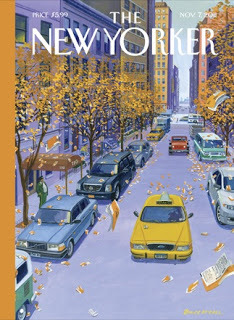
November 7, 2011: "The Stain" by Tessa Hadley
Here's another story by Tessa Hadley, the third this year. Ilike Hadley's work, and this story is terrific most of the way, but goes offthe rails at the end, in my opinion.
It's the story of Marina, a working-class woman, the wife ofGary and mother of Liam. Gary's business isn't going so well, so Marina needsto earn some extra money. She is hired by Wendy to take care of her father, wholives alone in a big house in their village. Marina is familiar with the house,having passed it often when she was a child, always wondering what it was likeinside. Now she knows. It's dark. It's unrenovated because the old man didn'twant to change anything—and so there are still the outlines of pictures on thewall that the previous owners have removed.
Wendy and the old man have moved from South Africa, althoughWendy's accent is nearly gone. Marina takes very good care of the man, whobecomes very fond of her. He tries to give her money and other gifts and evenwants to give her his house. Gary wouldn't mind if she accepted something—theycould use the money or they could put it aside for Liam's education—but hemostly understands why she won't. She is briefly in conflict with Wendy andthen with Wendy's son over the old man's desire to be generous with her.
So far so good. There's nice tension over the conflictbetween Marina and the old man and his family. The house is describedbeautifully. The old man plays with Liam in the garden when Marina brings theboy, and we get a detailed portrait of the character of the old man and Marina.Or at least we think we know the old man. Near the end, the old man's grandsonreveals something about his grandfather—the "stain" of the title—and then thepiece is over in a huge rush. Too much of a rush, and that spoiled the storyfor me.
Check out the Conversation with Tessa Hadley.
Published on November 01, 2011 09:55
October 31, 2011
GoneReading looks like a worthy cause
 I just learned (via a post on the blog) about GoneReading, a shopping site that offers gifts for readers AND a promise that 100% of profits will be donated to "fund reading libraries and other literacy projects in the developing world." Read more about the mission of the group here, and, if you want to support them, go shopping here.
I just learned (via a post on the blog) about GoneReading, a shopping site that offers gifts for readers AND a promise that 100% of profits will be donated to "fund reading libraries and other literacy projects in the developing world." Read more about the mission of the group here, and, if you want to support them, go shopping here.
Published on October 31, 2011 10:57



